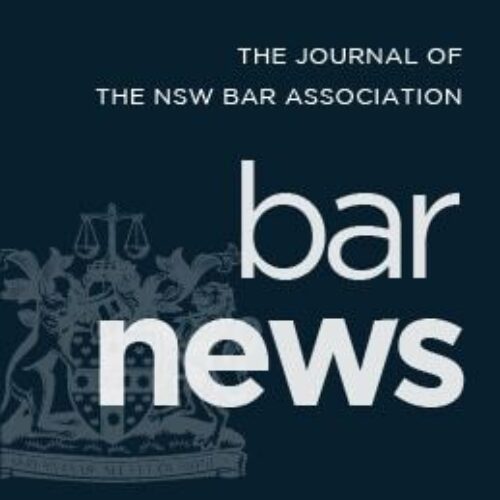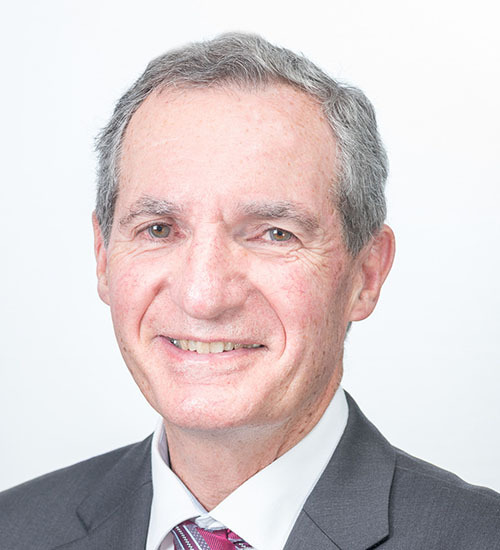- Winter 2024
- Retirement of his Honour Justice Derek Price AO

On 26 April 2024, the Honourable Justice Derek Michael Price AO retired as chief judge of the District Court and president of the Dust Diseases Tribunal.
In his 35-year judicial career (to date), Justice Price has left his mark on every level of the New South Wales court system. After 15 years as a solicitor, mostly practising in Dubbo, Justice Price joined the Bench in 1988 as a Local Court magistrate. In 1999, his Honour was made an acting District Court judge, an appointment that became permanent just a year later. There followed a three-year term as chief magistrate of New South Wales, then eight years as a Supreme Court judge, before his appointment in 2014 as chief judge of the District Court and president of the Dust Diseases Tribunal. In all of these offices, Justice Price has distinguished himself by his sound judgement, his rigorous intellect, his significant experience in the criminal law and, as head of both the Local and District courts, his administrative creativity and efficiency. In recognition of his significant contribution to the administration of justice, Justice Price became a Member of the Order of Australia in 2010 and an Officer of the Order of Australia in the General Division in 2020.
I first appeared before Justice Price in late 1992 when his Honour was the presiding magistrate in the now-defunct Commonwealth list at the St James Local Court. With his Honour’s calm good humour (and the occasional raise of an eyebrow), a generation of trial advocates were taught their craft. A statistically significant number of current judges of the New South Wales Supreme Court, the Federal Court, the New South Wales District Court and the New South Wales Local Court thank his Honour for that training.
The task a District Court chief judge faces is daunting. The chief judge oversees the work of more than 80 judges, scattered across Sydney and throughout regional New South Wales, who sit in complex criminal and civil matters, both at first instance and on appeal. At the same time, the chief judge coordinates the participation of the vast bulk of the 9,000 jurors who serve in New South Wales annually, while also managing the important relationship between the justice system and the officials who administer the state’s prisons. The chief judge also sits as a member of the New South Wales Judicial Commission, which plays a critical role in the maintenance of public confidence in the judiciary in this state.
Into the midst of this already difficult task came the COVID-19 pandemic. For the final four years of his term, Justice Price oversaw the District Court’s adaptation to viral conditions, first with a swift embrace of virtual hearing technology, and then with innovative empanelling processes to ensure face-to-face jury trials for the most part continued, despite social distancing requirements. Although juries were suspended during the lockdowns in both 2020 and 2021, it is a mark of Justice Price’s efficient leadership that, by the end of 2022, the pending criminal trial load in the District Court had returned to a more manageable figure.
Justice Price’s calm and orderly management approach equipped him well for a term that saw major growth in the District Court’s case load. One outcome of the Royal Commission into Institutional Responses to Child Sexual Abuse was the increase in lengthy and complex sexual assault prosecutions, most of them conducted in the District Court. To ensure these important trials could be heard, Justice Price convened a working group that in 2015 secured funding for a further two District Court judges. He also expanded the practice of multi-day ‘super call-overs’, where a single judge hears dozens of preliminary issues to encourage early finalisation. Orders for party conferences in criminal trials also became regular, with the aim of settling agreed facts, as did orders for written submissions on questions of law.
Under Justice Price’s leadership, the District Court also conducted its civil business with despatch, with more finalisations than filings in at least four years of his term. And, from 2022 until his retirement, Justice Price began the important task of preparing the court to confront the first increase in its civil jurisdictional limits since 1997 and the first increase in its equitable and injunctive jurisdiction since 1990.
His Honour’s tenure as chief judge also saw the introduction of the successful Walama list pilot, a critical program designed to address the overrepresentation of First Nations offenders in custody.
All this is on top of Justice Price’s time at the judicial coalface. While serving in the Supreme Court’s Common Law Division, his Honour presided over a series of murder cases, including the high-profile trial of United States marine, Walter Marsh, whom Justice Price sentenced to life imprisonment for the murder of Sydney nurse, Michelle Beets.
His Honour continued with an active court schedule even after his appointment as chief judge, sitting regularly in the Court of Criminal Appeal. There, he gave a series of important judgments, particularly on issues in the area of sexual crime and family violence. Some examples are DC v R [2019] NSWCCA 234; Agnew v R [2024] NSWCCA 5; AK v R [2022] NSWCCA 175; and R v Sharrouf [2023] NSWCCA 137. In Xerri v R [2021] NSWCCA 268, his Honour gave an influential analysis of the interaction between amendments to the Crimes Act[1] sexual offences and the sentencing legislation, an analysis which was earlier this year unanimously upheld in the High Court: Xerri v The King [2024] HCA 5.
With his deep experience, breadth of knowledge and steady judgement, Justice Price will be a welcome addition to the Court of Appeal, which he soon joins as an acting judge of appeal. The cross-jurisdictional insights he can offer represent a bridge between all three major courts in this state and will be an invaluable resource for our court and the people of New South Wales.

ENDNOTES
[1] Crimes Act 1900 (NSW).
